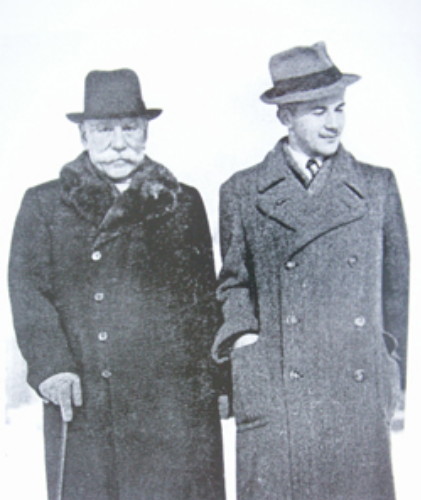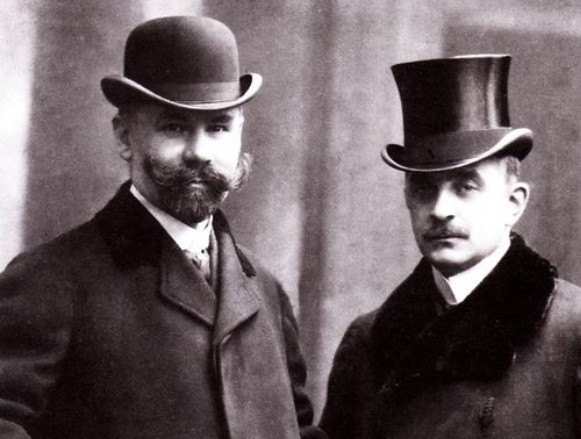Smal-Stotsky, Stepan
Smal-Stotsky, Stepan [Смаль-Стоцький, Степан; Smal’-Stoc’kyj], b 8 January 1859 in Nemyliv, Radekhiv county, Galicia, d 17 August 1938 in Prague. Philologist, pedagogue, and cultural, economic, and political figure; member of the Shevchenko Scientific Society from 1899 and the All-Ukrainain Academy of Sciences (VUAN) from 1918; father of Roman Smal-Stotsky. He studied at Chernivtsi University (1879–83) and Vienna University (PH D, 1884), where he became a disciple of Franz Miklosich. While serving as a professor of Ukrainian language and literature at Chernivtsi University (1885–1918), he played a key role in the national and cultural revival of Bukovyna's Ukrainians: he headed the Soiuz (1879–82), Ukrainska Shkola (1887–91), and Ruska Rada society (1904–14) and was a founding member of the People's Home, a leading member of the Ruska Besida in Bukovyna, a deputy from the National Democratic party in the Bukovynian Diet (1892–1911) and the Diet's deputy marshal (1904–10), a long-term coeditor of the daily Bukovyna, and a member of the Provincial Executive Board and Provincial School Council. He organized over 100 village reading rooms and, together with Mykola Vasylko and other Bukovynian leaders, fought for and attained equality for Ukrainians in Bukovyna's civil service and political life. As the head of the Ruska Kasa savings and loan society and Selianska Kasa union of agricultural credit unions, he helped build the Ukrainian co-operative movement in Bukovyna.
From 1911 to 1918 Smal-Stotsky was a member of the Austrian Parliament in Vienna. During the First World War he played a leading role in the Union for the Liberation of Ukraine. He was a cofounder of the Graycoats division and represented the Western Ukrainian National Republic's (ZUNR) Ministry of Military Affairs in Vienna. In 1917 he was in charge of the Ukrainian Sich Riflemen's charity work, propaganda, and publishing. From 1919 he lived in Prague, where he served as an envoy of the ZUNR, a professor at the Ukrainian Free University (1921–38), and director of the Museum of Ukraine's Struggle for Independence (1935–8). He was buried in Cracow.
Smal-Stotsky was a precursor of the phonological method in Ukrainian linguistics. In his works on Ukrainian linguistics and literature he combined positivist language with a national-romantic weltanschauung. He wrote Über die Wirkungen der Analogie in der Deklination des Kleinrussischen (1886, PH D dissertation) and, with Theodor Gartner, the influential Grammatik der ruthenischen (ukrainischen) Sprache (4 edns, 1893, 1907, 1914, 1928). In it he proved that the Ukrainian language sprang directly from Proto-Slavic, and vitiated the theory of a Proto-East Slavic language. He propounded the same view in his later works, particularly in his book on the development of views concerning the relatedness of the Slavic languages and their common origin (1925; rev edn 1927). He unequivocally opposed Vsevolod Hantsov's view that Standard Ukrainian developed out of the northern and southern Ukrainian dialects. His obvious exaggerations (eg, regarding the particular closeness of Ukrainian and Serbian and the absence of diphthongs in the northern Ukrainian dialects), however, hindered the acceptance of his many valid views by other linguists.
In literature studies, from 1913 Smal-Stotsky focused his attention on Taras Shevchenko's works. His studies were published as one book, Taras Shevchenko: Interpretatsiï (Taras Shevchenko: Interpretations, 1934; repr 1965). He also wrote a book on the culture and history of Bukovynian Rus’ (1897) and articles on the Hankenstein Codex; Ukrainian orthography and etymology; Ukrainian writers, such as Ivan Kotliarevsky, Markiian Shashkevych, Yurii Fedkovych, Vasyl Stefanyk (the preface to his first novella collection, 1897), Ivan Franko, and Olha Kobylianska; and his recollections of Nemyliv (1933).
BIBLIOGRAPHY
Na poshanu storichchia narodyn Stepana Smal’-Stots’koho, vol 172 of ZNTSh, ed K. Kysilevs’kyi (New York–Paris–Sydney–Toronto 1960)
Simovych, V. Ukraïns’ke movoznavstvo: Rozvidky i statti, vol 2, ed George Yurii Shevelov (Ottawa 1984)
Danylenko, V.; Dobrzhans’kyi, O. Akademik Stepan Smal’-Stots’kyi: Zhyttia i diial’nist’, 1859–1938 rr. (Kyiv–Chernivtsi 1996)
[This article originally appeared in the Encyclopedia of Ukraine, vol. 4 (1993).]


